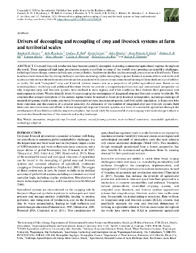Drivers of decoupling and recoupling of crop and livestock systems at farm and territorial scales.
Drivers of decoupling and recoupling of crop and livestock systems at farm and territorial scales.
Autoria: GARRETT, R. D.; RYSCHAWY, J.; BELL, L. W.; CORTNER, O.; FERREIRA, J. N.; GARIK, A. V. N.; GIL, J. D. B.; KLERKX, L.; MORAINE, M.; PETERSON, C. A.; REIS, J. C. dos; VALENTIM, J. F.
Resumo: Crop and livestock production have become spatially decoupled in existing commercial agricultural regimes throughout the world. These segregated high input production systems contribute to some of the world's most pressing sustainability challenges, including climate change, nutrient imbalances, water pollution, biodiversity decline, and increasingly precarious rural livelihoods. There is substantial evidence that by closing the loop in nutrient and energy cycles, recoupling crop and livestock systems at farm and territorial scales can help reduce the environmental externalities associated with conventional commercial farming without declines in profitability or yields. Yet such 'integrated' crop and livestock systems remain rare as a proportion of global agricultural area. Based on an interdisciplinary workshop and additional literature review, we provide a comprehensive historical and international perspective on why integrated crop and livestock systems have declined in most regions and what conditions have fostered their persistence and reemergence in others. We also identify levers for encouraging the reemergence of integrated crop and livestock systems worldwide. We conclude that a major disruption of the current regime would be needed to foster crop-livestock reintegration, including a redesign of research programs, credit systems, payments for ecosystem services, insurance programs, and food safety regulations to focus on whole farm outcomes and the creation of a circular economy. An expansion of the number of integrated crop and livestock systems field trials and demonstrations and efforts to brand integrated crop and livestock systems as a form of sustainable agriculture through the development of eco-labels could also improve adoption, but would likely be unsuccessful at encouraging wide-scale change without a more radical transformation of the research and policy landscape.
Ano de publicação: 2020
Tipo de publicação: Artigo de periódico
Unidade: Embrapa Amazônia Oriental
Palavras-chave: Adopción de innovaciones, Adoção de Inovações, Agricultura Sustentável, Agricultura sustentable, Agricultural production, Cropping systems, Innovation adoption, Integrated agricultural systems, Integrated crop-livestock systems, Integração lavoura-pecuária, Pecuária, Produção Agrícola, Sistema de Cultivo, Sistemas agrícolas integrados, Sustainable agriculture, Technology transfer, Transferência de Tecnologia
Observações
1 - Por padrão são exibidas publicações dos últimos 20 anos. Para encontrar publicações mais antigas, configure o filtro ano de publicação, colocando o ano a partir do qual você deseja encontrar publicações. O filtro está na coluna da esquerda na busca acima.
2 - Para ler algumas publicações da Embrapa (apenas as que estão em formato ePub), é necessário ter, no celular ou computador, um desses softwares gratuitos. Sistemas Android: Google Play Livros; IOS: iBooks; Windows e Linux: software Calibre.
Acesse outras publicações
Acesse a Base de Dados da Pesquisa Agropecuária (BDPA) para consultar o acervo completo das bibliotecas da Embrapa.

